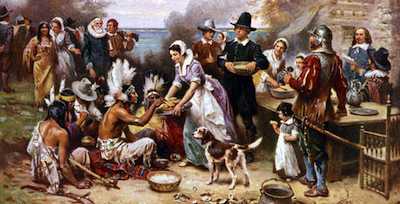
That God will bless America Both now and evermore, As never hath a land so much To be so thankful for
“Thus out of small beginnings greater things have been produced by His hand. And as one small candle may light a thousand, so the light here kindled hath shone to many. Let the glorious name of Jehovah have all the praise.” (William Bradford, Governor of Plymouth County, 1621)
Thankful they assembled there,
A humble Pilgrim band,
To praise their God in silent prayer
That He should bless their land.
A humble Pilgrim band,
To praise their God in silent prayer
That He should bless their land.
Through winter unforgiving,
Through pestilence and war,
Those grateful few yet living knew
What they were thankful for.
Through pestilence and war,
Those grateful few yet living knew
What they were thankful for.
As they feasted on their succotash,
Maize and wild game,
Doubtless they did pause to think
On why it was they came.
Maize and wild game,
Doubtless they did pause to think
On why it was they came.
Enduring death and hardship,
On this lonely, hostile shore,
To escape the persecutor’s rod
And live free evermore.
On this lonely, hostile shore,
To escape the persecutor’s rod
And live free evermore.
Yet well they braved the suffering
That they had come to find
And passing silent longings for
The land they left behind.
That they had come to find
And passing silent longings for
The land they left behind.
For the liberty to worship free
Was worth their pain and fear,
As gratefully they thanked Him:
“Lord, how good we have it here.”
Was worth their pain and fear,
As gratefully they thanked Him:
“Lord, how good we have it here.”
Unceasing hath He blessed us since
That first Thanksgiving Day,
Throughout this nation’s lofty rise
His grace hath shone the way.
That first Thanksgiving Day,
Throughout this nation’s lofty rise
His grace hath shone the way.
For this blessed land America’s
The living legacy
Of the simple faith of humble men
So thankful they were free.
The living legacy
Of the simple faith of humble men
So thankful they were free.
And if this suff’ring Pilgrim band
Could yet see fit to give
Their grateful thanks to Him whose grace
Had simply let them live,
Could yet see fit to give
Their grateful thanks to Him whose grace
Had simply let them live,
Then yet a thousand times more thankful
Should our people be
For this nation’s bounteous wealth,
Her strength and liberty.
Should our people be
For this nation’s bounteous wealth,
Her strength and liberty.
So it is only fitting that
We thank Him on this day,
Reflecting on our blessings as
We bow our heads to pray….
We thank Him on this day,
Reflecting on our blessings as
We bow our heads to pray….
That God will bless America
Both now and evermore,
As never hath a land so much
To be so thankful for.
Both now and evermore,
As never hath a land so much
To be so thankful for.


